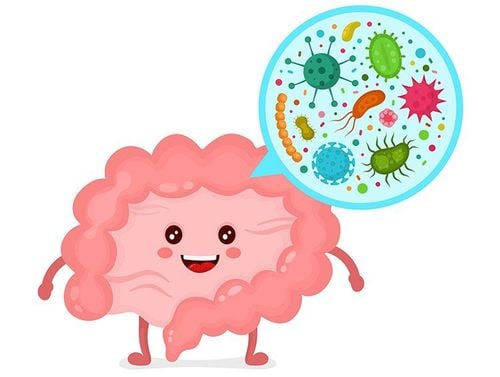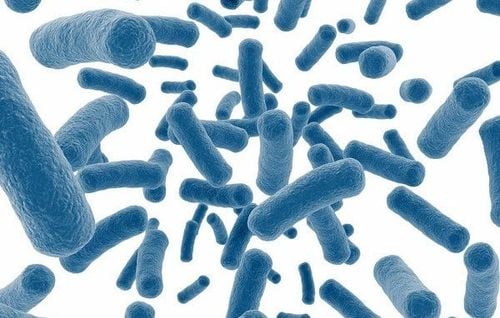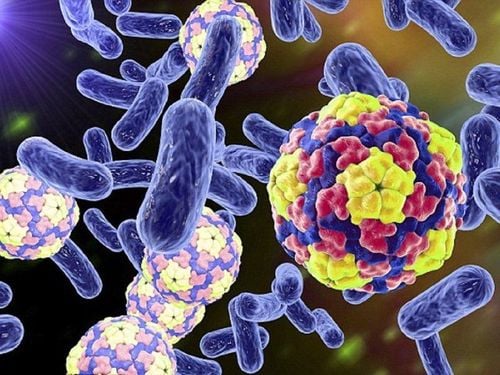This is an automatically translated article.
The infant gut microbiota is of great importance for the health of the young child. They create protective barriers for the body against the risks caused by diseases and external environmental influences. So what do we need to do to balance the intestinal microflora in young children?1. What is the gastrointestinal microbiome in children?
The microbiome of the human gastrointestinal tract lives in a complex ecosystem. It is normally acquired by the neonate after birth and is influenced by reproductive patterns and environmental pollution.At birth, the digestive tracts are immature and their development continues into the first years of life. During this period, other factors can also influence bacterial colonization in the GI tract such as breastfeeding pattern (breastfeeding or “formula feeding”) and possibly genetics. (genotype).
2. Function of the intestinal microbiota in children
The main function of the gut microbiota is to limit the growth of potentially pathogenic microorganisms and to prevent the entry and performance of these microorganisms into the ecosystem. In addition, the microbiota, competing for space, has the ability to secrete antimicrobial substances (bacteria) to inhibit the proliferation of other bacteria.During this process, the microflora remains stable, metabolizing minuscule and indigestible products. Fermentation of undigested carbohydrates produces short-chain fatty acids, which play an important role in regulating various processes in the gastrointestinal tract, including electrolytes, (Ca, Mg and Fe). and water absorption, cell proliferation and differentiation, hormone secretion and immune system activation. Furthermore, the short chains are used as an energy source by the organism, including color cells and a small part of the liver and muscle. Metabolic functions have also been attributed to the microbiome, such as the production of vitamins (K, B12, biotin, folic and pantothenic acids) and the synthesis of amino acids from ammonia or urea.
3. What is intestinal microbiota imbalance in children?
Imbalance of intestinal microflora is a change in the composition and quantity of microorganisms in the intestinal tract, causing beneficial bacteria to decrease and harmful bacteria to increase.In a child's body, there are many harmful bacteria called microbiota. Most of these bacteria significantly affect the health of children, causing the child's body to become imbalanced, leading to intestinal dysbiosis.
Some effects form biological disturbances such as mild stomach upset. In many cases, young children do not need treatment and the body corrects this balance on its own.

Mất cân bằng hệ vi sinh đường ruột dẫn tới chứng rối loạn loạn khuẩn đường ruột
4. Causes of intestinal microflora imbalance in children
4.1 Due to the birthing process Through research by medical experts, it is shown that the difference in the intestinal microbiota of children born by cesarean and vaginal birth is completely different.Babies born vaginally have a much more diverse and richer gut microbiota. Infants are born at first, the body is completely sterile because during the natural birth process, they are passed through the vagina, so they receive the bacteria in the microbiome from the mother's intestinal tract. From here, the child's biological system begins to form.
When babies are born by cesarean section, there is no chance of exposure to bacteria in the mother's microbiome, leading to an imbalance.
4.2 Nutrition and child care Nutritional diet and child rearing is also a decisive factor for the diversity of the intestinal microbiota in young children.
With breastfed babies, Bifidobacteria account for about 75-90% of the total number of intestinal microorganisms, Lactobacilli and Bacteroides gradually increase with less number and Enterobacteria decrease sharply.
In infants fed formula milk, the intestinal microflora is mainly composed of microorganisms such as Bacteroides, Bifidobacteria, Coliforms. As children grow older, the intestinal microbiota is similar to that of adults: Bacteroides, Veillonella, and Fusobacterium.
In addition to the child's nutrition when growing up, it also affects the intestinal microflora. Unsecured and unreasonable nutrition, parents giving their children a poor variety of food, foods that are difficult to digest or giving their children a diet that is not healthy, this is one of the causes leading to an imbalance in the microbiological system. born.
4.3 Infection and exposure to antibiotics When a child has an infection, antibiotics are needed. This is one of the most common causes of an imbalance in the microbiome. The effect of antibiotics in addition to killing bacteria also makes a part of beneficial bacteria affected.
4.4 Other diseases acquired When young children have gastrointestinal diseases such as peptic ulcers or some young children have gastrointestinal surgery or radiation therapy.
5. Signs of intestinal microflora imbalance in children
When a child's body doesn't have enough good bacteria, bad bacteria can grow. The following may be signs of an imbalance of gut bacteria in children:Autoimmune problems that occur in young children, such as thyroid problems, rheumatoid arthritis and type 1 diabetes Digestive problems, such as irritable bowel syndrome, constipation, diarrhea, heartburn or bloating Sleep problems, young children sleeping disorders Rashes and allergies skin reactions Young children crave sugar Unexplained fatigue or lethargy Unexplained mood disturbances, such as depression or anxiety Unexplained weight loss or gain. When experts hear parents say these things from their children, they will ask about their children's diets and the quality of food that parents are feeding their children. If there is no other medical cause, their symptoms may be related to an unhealthy gut.

Mất cân bằng hệ vi sinh đường ruột ở trẻ khiến vi khuẩn xấu gia tăng
6. What to do to rebalance the intestinal microbiota in children?
A child's gut health really says a lot about their inner health. Keep your gut microbiome balanced and your child's overall health by practicing these tips.Here's how to improve the balance of the child's intestinal microflora:
6.1 Avoid overeating Children should eat according to the appropriate portion, ensure adequate nutrition but do not give the child so much food that the system The baby's digestive system can't handle it.
6.2 Eat fiber-rich foods Keep your child's gut healthy with fiber-rich foods like beans, berries, and whole grains.
6.3 Drink plenty of water at the right times Staying hydrated will have a beneficial effect on your child's gut. This is especially important in hot climates.
6.4 Get your kids moving When kids exercise, endorphins are released and this helps reduce stress, promotes good bacteria in the body, which in turn helps a better gut.
In addition, you should also expose your child to early morning sunlight so that the child's body can absorb the essential amount of vitamin D, which is necessary for bones, skin and hair.
6.5 Bringing good bacteria into your child This means eating foods like yogurt, miso (a condiment used in soups) that help provide good gut bacteria that are beneficial for their health small.
In addition to balancing the intestinal microflora in children, in the process of raising children, parents need to add necessary micronutrients: Zinc, selenium, chromium, vitamins B1 and B6, ginger, acerola fruit extract. vitamin C),... to improve taste, eat well, achieve height and weight in accordance with standards and exceed standards, have a good immune system, enhance resistance to less sickness and less digestive problems.
Also according to leading nutrition experts, parents need to be calm and persistent when supplementing with nutrients for children, even through eating or functional foods. In particular, the use of functional foods should choose those of natural origin that are easily absorbed, do not allow simultaneous use of many types or continuously change the types of functional foods. Besides, nutrition experts also emphasized on the role of biological zinc; Parents should learn and supplement zinc for children properly at the appropriate time, to avoid zinc deficiency affecting the comprehensive development of children.
To have more knowledge of raising healthy children, parents should proactively update useful medical information on Vinmec.com website and immediately contact doctors and experts at Vinmec when needing support.
Please dial HOTLINE for more information or register for an appointment HERE. Download MyVinmec app to make appointments faster and to manage your bookings easily.













